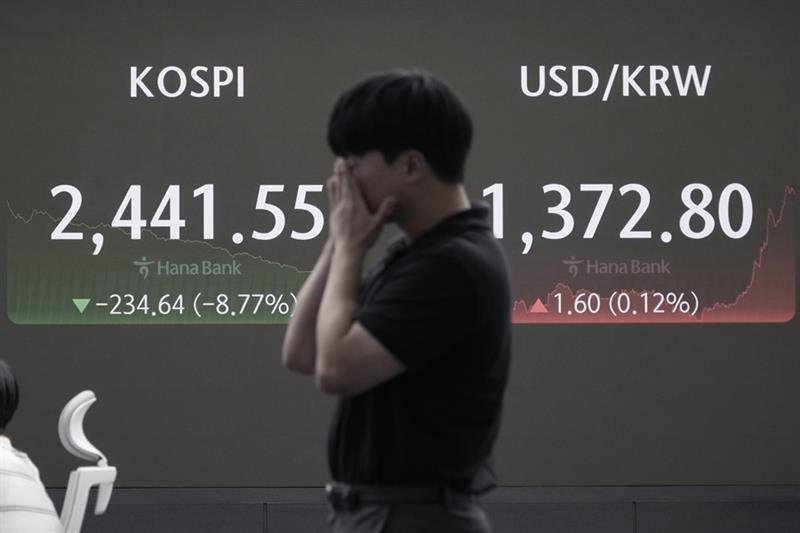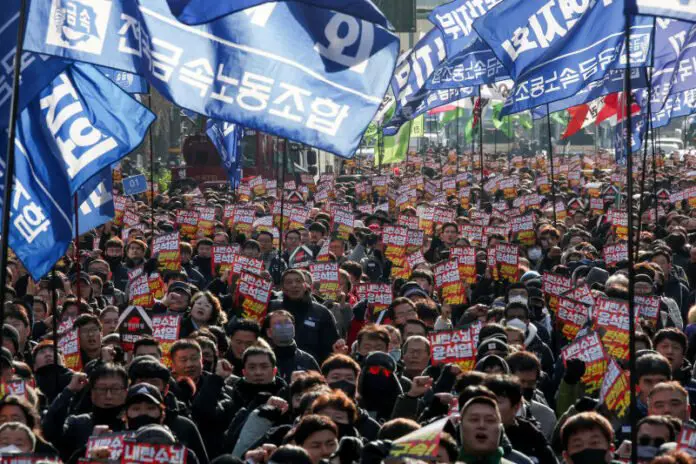Staff Reporter
South Korea is facing significant economic turmoil as a political power struggle unfolds, causing instability in the stock market and driving the won to historic lows. The uncertainty has left even the nation’s largest corporations unsure about the future.
The situation has worsened since President Yoon Suk Yeol’s brief declaration of martial law in early December, which has left the country in a state of disarray. The political crisis is already taking its toll on the economy, with the stock market showing instability, the won depreciating further, and foreign investors turning to other markets.
At the heart of the turmoil is an ongoing struggle for power. The Constitutional Court is currently considering whether President Yoon can be impeached, while the opposition Democratic Party is calling for an immediate general election.
As the U.S. elections approach, Trump has referred to South Korea as a “money machine,” suggesting he may demand that Seoul contribute billions more for U.S. troop deployments.
Business Confidence Plummets to Pandemic-Era Lows
“To put it mildly, a lot of the political turmoil we’ve seen over the past month remains unresolved,” said Kim Sang-woo, a former politician with the left-leaning South Korean Congress for New Politics and a board member of the Kim Dae-jung Peace Foundation.
“The won was already weak against the dollar, and the unrest has exacerbated that situation. I fear there is no clear understanding of who is governing the country right now.”
This uncertainty is unsettling for businesses, which are hesitant to make plans for the upcoming year. The political crisis could lead to several outcomes: President Yoon might avoid impeachment and regain stability, although this could provoke anger among significant segments of the public. Alternatively, Yoon’s rivals from the Democratic Party could push for a new election, which they would likely win.
Currently, the country feels adrift.
A recent poll by the Bank of Korea revealed that business sentiment has dropped significantly, with the monthly Composite Business Sentiment Index falling 4.5 points from November, reaching its lowest level since September 2020—when the economy was grappling with the full effects of the COVID-19 pandemic.
In a separate report, the central bank projected that economic growth for 2025 could remain below 2%, driven by weak export growth and diminished consumer spending, with the potential for even lower growth if global trade tensions escalate.
Stock Exchange Declines Again
On Monday, shares on the Korea Composite Stock Price Index (KOSPI) managed to recover some ground lost following President Yoon’s announcement. However, analysts attribute ongoing market jitters to the prevailing political uncertainty.

The South Korean won continued its downward trend against the dollar, trading near 16-year lows not seen since the global financial crisis.
Additionally, the government confirmed on December 30 that foreign investors have sold over 17 trillion won in Korean treasury bonds since Yoon declared martial law, indicating a significant loss of confidence in the country’s financial stability.
This latest economic turmoil comes on the heels of several months of disappointing corporate earnings. Last week, the government reported a decline in tax revenues, which fell by 8.5 trillion won (approximately $5.9 billion) in the first 11 months of 2024 compared to the previous year.
What Will the US-China Tensions Mean for South Korea?
South Korean companies face a significant risk as many rely on components sourced from Chinese firms.
With Donald Trump returning to the political scene and the US-China trade war threatening to intensify, these businesses may face even higher penalties as the US seeks to push China out of its production chains.
“There is considerable uncertainty surrounding the upcoming administration in Washington, particularly regarding Trump’s stance on tariffs and the pressure he may exert on Seoul to renegotiate the South Korea-US free trade agreement,” said Mason Richey, a professor of politics and international relations at Hankuk University of Foreign Studies in Seoul.
What If Yoon’s Rivals Take Power?
While businesses are eager for the stability of a settled government, many are less than enthusiastic about the prospect of South Korea’s Democratic Party returning to power, according to Mason Richey, a professor of politics and international relations at Hankuk University of Foreign Studies.
“If Yoon is impeached and removed from office, an election would need to take place within 60 days, and it seems very likely that the Democratic Party would emerge victorious,” Richey noted.
“However, they tend to be more inclined to impose taxes and regulations on industry than the current Yoon administration.”

